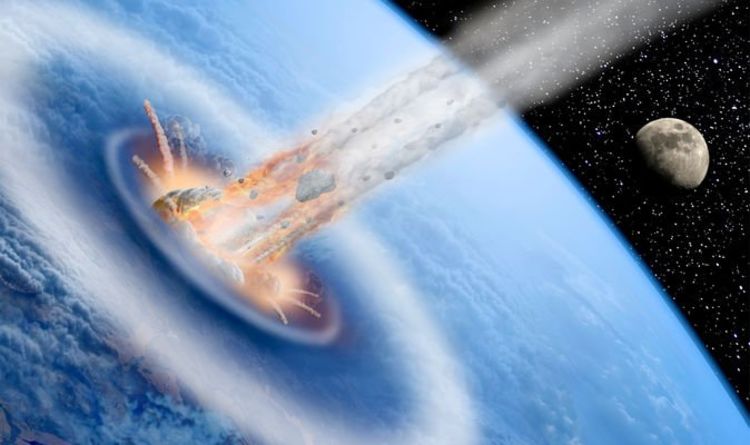Killer asteroids lurking beyond our sight in the void of space are an ever-present threat to all life on Earth. When a six-mile-wide (10km) rock struck the planet 66 million years ago, the impact triggered a global extinction event. The asteroid effectively wiped out the dinosaurs and killed 75 percent of life and kick-started a nuclear winter. If another asteroid on this scale is found barreling towards our planet, odds are humanity will not stand a chance of survival.
Because of this danger, space expert Lembit Öpik believes it is critical to detect incoming impacts as far ahead into the future as possible.
Mr Öpik is the Chairman of Parliament for the micronation Asgardia and a former British Member of Parliament.
Mr Öpik’s political career is noted for his campaigns to raise awareness of the dangers posed by spaceborne threats.
The expert recently argued there is a 100% certainty an asteroid will hit Earth in the unforeseeable future.
He told Express.co.uk: “We need maybe half-a-dozen telescopes on permanent watch and the willingness to get together and have a deflection system, which can be implemented quickly.
WATCH HERE: Major asteroid DESTROYS Earth in fiery crash simulation
“The time scales are still long. We need 10 to 20 years to deflect these successfully.
The best you can do is distribute a lot of Bibles because there’s not much else you can do
Lembit Öpik, Chairman of Parliament for Asgardia
“You can’t do it like in Hollywood, 24 hours before it’s going to hit the Earth.
“If it’s 24 hours away, probably the best you can do is distribute a lot of Bibles because there’s not much else you can do.
“You can’t even evacuate a continent in 24 hours and so you need that time to do something about it.”
The micronation of Asgardia, known as the Space Kingdom of Asgardia, was formed in 2016 by a group of people who launched a small satellite into space.
Asgardia’s founders believe going into space is the next step in human evolution.
Among its goals, the micronation lists conceiving the first human child in space in the next 25 years.
Mr Öpik said: “There is no shortage of people, even if there are threats, who want to go into space, who are willing to take the risk.”
Going into space is also how Asgardia’s scientists want to protect humanity from the dangers of asteroids.
Mr Öpik has extensively campaigned on the issue while an MP for Montgomeryshire in Wales between 1998 and 2010.
Through his work, the Government initiated the Near-Earth Object Task Group, which concluded in 2000 more needs to be done to address the risk of asteroid impacts.
Mr Öpik said: “When you think about going into space, all of these have to be taken into consideration.
“That’s why Asgardia is having a science congress in October, from the 13th to 16th in Darmstadt in Germany.
“We’re beginning to talk about the biology of living in space and related subjects, there will be formal sessions and formal discussions too.
“You have to plan years ahead to get these things right.”
Source: Read Full Article




